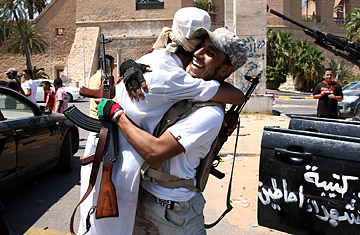
Libyan rebel fighters hug each other as they celebrate in the newly named Martyr's Square, formerly known as Green Square, in the capital of Tripoli on Aug. 24, 2011
As Libyans absorb the dizzying collapse of Muammar Gaddafi's 42-year rule, one question hovers just under the surface of the wild celebrations: Did Gaddafi's hard-core supporters plot an armed retreat in order to carry out a future insurgency?
With Tripoli's security precarious and Gaddafi and his inner circle still nowhere to be found, fighting raged on Wednesday in several pockets of Tripoli, as rebels and hard-core regime fighters battled for control over the last disputed neighborhoods. Rebels ferried streams of their wounded comrades into overwhelmed hospitals. Amid the violence, there was one happy breakthrough: the 35 foreign journalists trapped inside the city's Rixos Hotel were finally freed by the Gaddafi gunmen inside.
Even as the battles continue, Libya's rebel leaders have begun the daunting task of piecing the country together, not just from the ravages of a brutal six-month conflict but also from the dysfunction of decades of autocracy. With no functioning government, patchy border control and few basics of civil society up and running, the rebels' National Transitional Council (NTC) has pushed hard for other countries to immediately release billions of dollars from Gaddafi's funds, which have been frozen since the revolt exploded in February.
Money itself is not the problem: with huge oil reserves and only 6.4 million people, Libya has innate wealth, which the new leaders can now tap to rebuild the country — a far different situation than what Libya's neighbors Tunisia and Egypt face. Qatar announced that it would host an overnight meeting to try to release more than $2 billion in emergency aid. And in Paris, NTC chairman Mahmoud Jibril met French President Nicolas Sarkozy to discuss how to quickly unfreeze funds and begin a smooth transition, including possibly holding Libya's first-ever elections within nine months. Jibril — a U.S.-trained economist who until February headed Libya's National Economic Development Council — told reporters afterward that Sarkozy was especially eager for success in Tripoli, since he "bet his presidency on us six months ago."
But money cannot necessarily buy peace. Rebel leaders said on Tuesday that dangers remained so long as they were still hunting the Gaddafis and their inner circle, including Gaddafi's hard-line intelligence chief Abdallah al-Senousi. NTC officials announced a 2 million dinar (about $1.7 million) bounty for Gaddafi, funded by a Libyan businessman. And Sarkozy said the NATO campaign would continue until "there is no longer any threat to the Libyan people."
The threats could remain for quite some time, however. In the minds of some Libya watchers, Gaddafi's hard core could well be planning a longer-term insurgency from a safe distance from Tripoli. Rebel officials believe that the family slipped out of the capital at the last moment, along with its die-hard supporters.
According to one Libyan who has had contact with regime supporters during the conflict, that retreat was planned well in advance. He says he was told last month by tribal officials allied to Gaddafi that they had been carefully crafting a retreat, as the regime increasingly became aware that it was unlikely to survive. "It is obvious that everything is ready for them," says Noman Benotman, former head of an armed militant Libyan group who is now a senior analyst for the London think tank Quilliam. "The way he evacuated Tripoli was all part of the plan."
